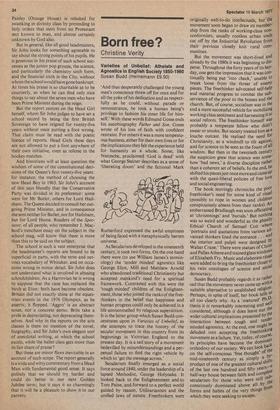Born free?
Christine Verity
Varieties of Unbelief: Atheists and Agnostics in English Society 1850-1960 Susan Budd (Heinemann £9.50) 'And thus desperately challenged the young man's conscience threw off for once and for all the yoke of his dedication and as respectfully as he could, without parade or remonstrance, he took a human being's privilege to fashion his inner life for himself.' With these words Edmund Gosse ends his autobiography Father and Son. Gosse wrote of his loss of faith with confident restraint. For others it was a more tempestuous business, either for their own lives or for the implications they felt the experience held for humanity as a whole. Some, like Nietzsche, proclaimed 'God is dead' with what George Steiner describes as ,a sense of 'liberating doom' and the fictional Mark Rutherford expressed the awful emptiness of being faced with a metaphysically barren universe.
As Secularism developed in the nineteenth century, it took two forms. On the one hand there were (to use William James's terminology) the 'tender minded' agnostics like George Eliot, Mill and Matthew Arnold who abandoned traditional Christianity but accepted mankind's need for a spiritual framework. Contrasted with this were the 'tough minded' children of the Enlightenment, those who joined the ranks of the freethinkers in the belief that happiness and human progress could only be achieved in a life untrammelled by religious superstition. It is the latter group which Susan Budd concentrates upon in Varieties of Unbelief, as she attempts to trace the history of the secular movement in this country from its beginnings in Victorian England to the present day. It is a sad story of a movement bedevilled by misunderstandings and a perpetual failure to find the right vehicle by which to 'get the message across.'
Secularism finally emerged as a social force around 1840, under the leadership of a lapsed Methodist, George Holyoake. It looked back to the Enlightenment and to Torn Paine, and forward to a perfect world guided by reason, Utilitarianism and the unified laws of nature. Freethinkers were
originally well-to-do intellectuals, but the movement soon began to draw its membership from the ranks of working-class nonconformists, usually rootless urban souls cut off by the Industrial Revolution from their previous closely knit rural communities.
But the movement was short-lived and already by the 1880s it was beginning to disperse. Throughout the forty years of its heYday, one gets the impression that it was continually being put 'into check,' unable to break loose from the threat of enemY pieces. The freethinker advocated self-helP and material progress to combat the subservience of the poor to the bosses and the church. But, of course, socialism was in the end amore successful vehicle for mobilising working class sentiment and harnessing it to social reform. The freethinker himself was probably a temperate fellow who didn't swear or smoke. But society treated him as 3 louche outcast. He realised the need for Christianity, as a windmill to tilt against, and for science to be seen as the fount of all wisdom. But then in the twentieth century. the suspicion grew that science was some
tad news,' a diverse discipline rather than a coherent set of beliefs. In the end, he shifted his pieces just once more and came UP with the quasi-liberal policies of free love and social engineering.
The book movingly chronicles the POI, freethinker's need for some kind of ritual (possibly to rope in women and children conspicuously absent from their ranks). An embarrassed Bradlaugh was soon officiating at 'christenings' and 'burials.' But nothing was so weird and wonderful as the ghastlY Ethical Church of Samuel Coit where 'portraits and quotations from various advanced thinkers lined the entrance . . and the interior and pulpit were designed bY Walter Crane.' There were statues of Christ and Pallas Athene and stained glass windows, of Elizabeth Fry. Music and elaborate ritual were added to bring the freethinker closer.to his twin ontologies of science and social democracy. Susan Budd probably regards it as rather -sad that the movement never came up %oha suitable alternative to establishedreligion. Perhaps, in spite of itself, her book tells us all too clearly why. As a 'matured' Ph.L?; thesis it is remarkably interesting and we'"
he considered, although it does leave out t
wider cultural implications presented by the interaction between tough and tencLer minded agnostics. At the end, one might.°` deluded into accepting the freethinking movement as a failure. Yet, today, of course; its principles have become the dominari,, orthodoxy of our society. We can look bac; on the self-conscious 'free thought' of .t mid-nineteenth century as simplY a 11.1„ product of one of the greatest cultural shl": of the last one hundred and fifty years -1 half-way house between faith and comPlel..Ub secularism for those who were still consciously dominated above all by U.; forms and habits of the very things fr° which they were seeking to escape.


































 Previous page
Previous page